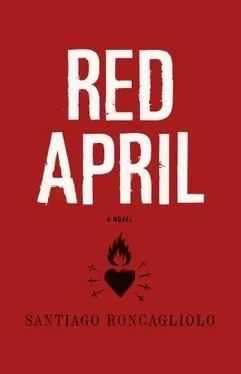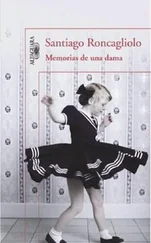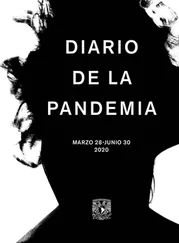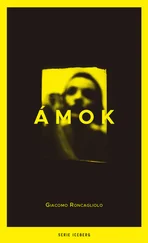“I'm sorry.” The prosecutor withdrew.
“I don't want you to think badly of me afterward,” she said.
He sat up. He was aware he ought to respect her and he did not know what to do. Solitude is dangerous. It accumulates until it becomes uncontrollable and explodes. He thought that in the end he would ruin everything. He wanted to offer her a mate . Perhaps an alcoholic drink would be better, but he did not have any. He spent several minutes trying to say something before too much time went by. He managed to articulate:
“It's just that with you I feel less absurd. You're one of the things I don't understand, but the only one I like not understanding.”
She smiled and kissed him. He accepted the kiss and returned many more but avoided touching her too much.
The next morning, the prosecutor felt revitalized, happy: for the first time in a long while he had not had nightmares. As he crossed the parade of confraternities going to the Church of the Magdalena to prepare the vestments of the holy images for Friday, he felt that the city was recovering its life as they passed by. He reached the office earlier than usual, with a picture of his mother and an ID photo of Edith that she had given him the night before, toward the end, as he walked her home. He placed both images in a picture frame on his desk and opened the windows to air out the office. He happily greeted the embittered secretary of the Provincial Prosecutor and sat down to do some work.
There was no work to do.
Determined not to waste time, he took out the report on Edwin Mayta Carazo that he had put in the drawer and looked at it again. All in all, it did not say anything so terrible. A detachment of troops had carried out its normal routine duties ten years ago and then released the suspect. And that was all. Perhaps it might prove useful in subsequent investigations: everything indicated that this Edwin was part of the group harassing the police outpost in Yawarmayo. It seemed correct to have written it although there was no open case. Its effect had been positive and had eased his dreams, as he had hoped. He thought about his ex-wife. He realized her memory was beginning to disappear, to fade into oblivion. One needs a present in order not to have to think about the past. The prosecutor had one. That day it seemed to him that Ayacucho had one, that the city needed only a little more air, a little more light.
As he hummed an old huayno that he recalled hearing his mother sing, he put the report back in its drawer and turned the key twice. He spent the rest of Thursday playing with the wad of paper, feeling that an enormous weight had lifted from his shoulders. When he left the office, the bands were beginning to play. In the churches they were burning broom while men walked through the streets with bulls that shot off fireworks. Fire bulls. Chacaltana smiled. For the first time in days, fire seemed to be an omen of celebration and joy.
On Friday the 14th, at 5:30 a.m., the Associate District Prosecutor opened his eyes to the sound of excessively loud pounding at the door. He recognized the difference between blows from fists and blows from rifle butts. These were the latter. Without opening the door, he announced that he would dress and come out, but the soldiers insisted on coming in. With nothing to fear, the Associate District Prosecutor opened the door. There were three of them. Two were armed with FAL rifles. The third, an army lieutenant, carried a pistol at his waist. They were not aiming their weapons at him, but they indicated they were in a hurry. Commander Carrión's orders.
The prosecutor barely had time to wash a little and go with them. They had him climb into a jeep, flanked by the two soldiers. He saw that their rifles did not have the safeties on. He preferred not to say anything. The jeep drove out of the city and went up Acuchimay Hill, heading for Huanta. The prosecutor saw dawn break near the Christ of Acuchimay, while he imagined at his back the city topped with tiles and surrounded by dry hills, even though the last rains of the season were still falling. Christ protected the city spread out at his feet. The prosecutor wondered if he would protect him too. He wanted to know where they were taking him.
“Are we going to Huanta?”
“You are not authorized to speak, Señor Prosecutor.”
He was not authorized to speak. Like the inmate at the Huamanga prison.
“Is it because of what happened at the prison? I used Commander Carrión's name to get in but … I know I committed an irregularity, but I believe he will understand … It was an official investigation …”
“Señor Prosecutor.”
“What is it?”
“Be quiet.”
He obeyed. Perhaps that had been his most imprudent act. A beginner's mistake. Certainly the commander would understand that. Perhaps he had simply read his report and sent for him to congratulate him. Yes. That was most likely. He had once called him “my trustworthy man.”
They turned left onto an unpaved road and crossed a rocky terreplein that made the jeep bounce. They drove for another half hour until they stopped in front of a military reserve. After showing identification, they continued driving until the rough ground did not allow them to go on. They got out, holding the prosecutor by the arm. They walked, almost climbed the slope of a cliff where the prosecutor slipped several times and the soldiers picked him up with very little delicacy. The prosecutor knew there were no barracks nearby. He did not understand where they were taking him. When they reached the top of the hill, the prosecutor could see what was on the other side. An enormous hole ten meters across, hidden by the hills. A military cordon surrounded the wide pit. He knew without having to ask what was inside. On one side, directing the military detachment, was Commander Carrión. Someone told him the prosecutor was arriving. The commander looked very serious. The prosecutor tried to smile as pleasantly as he could.
“Good morning, Commander. I was surprised by your summons …”
“Come over here, Señor Prosecutor,” was all the commander would say. “Look at this.”
The prosecutor looked up at the hole. His feet refused to move. He heard a rifle being cocked behind him. He took a few steps, very slowly, before he felt the shove that hurried him toward the excavation. Behind his feet he heard a pair of military boots advancing. He approached the huge hole and stopped a meter from the edge. He felt another shove. He was sweating. He took out his handkerchief and wiped his forehead. He dared to turn around. The commander was about twenty meters from him. He motioned for him to look in. Around him, the soldiers had moved out toward the hills that surrounded the hole, as if not to see. The prosecutor felt another shove. He wondered if it was a hand or the barrel of an FAL. He turned to see the face of the soldier who had come with him. The soldier was pale and muttered:
“Turn around, damn it.”
The prosecutor looked at the sky. The sky was clear, just a few black clouds in a corner, probably heading for Ceja de Selva. He looked down at the ground again. Slowly, he advanced a step and stretched his neck, looking into the circular blackness of the excavation.
The spectacle inside disconcerted him. At first he thought he saw only boxes, old ruined boxes, surrounded by cloth rotted by time and earth. But then, what he had thought were rocks and earth began taking on a more precise form before his eyes. They were limbs, arms, legs, some semipulverized at the time of their burial, others with bones clearly profiled and surrounded by cloth and cardboard, black, earth-covered heads one on top of the other, forming a mountain of human remains several meters deep. One could not even see the end of this accumulation of bones and dry bodies. The prosecutor fell to his knees and vomited. As he threw up the little he had in his stomach, he realized he was in a perfect position to join the bodies down below, the nape of his neck exposed, offered to the rifles, his body leaning over the hillocks of death, his mind lost in some moment of time when everything was even more dangerous, asking himself how long it would take that time to finish dying, how much longer it would take the memory to disappear, the pain to be extinguished, the wounds to scar over, the eyes to close.
Читать дальше












